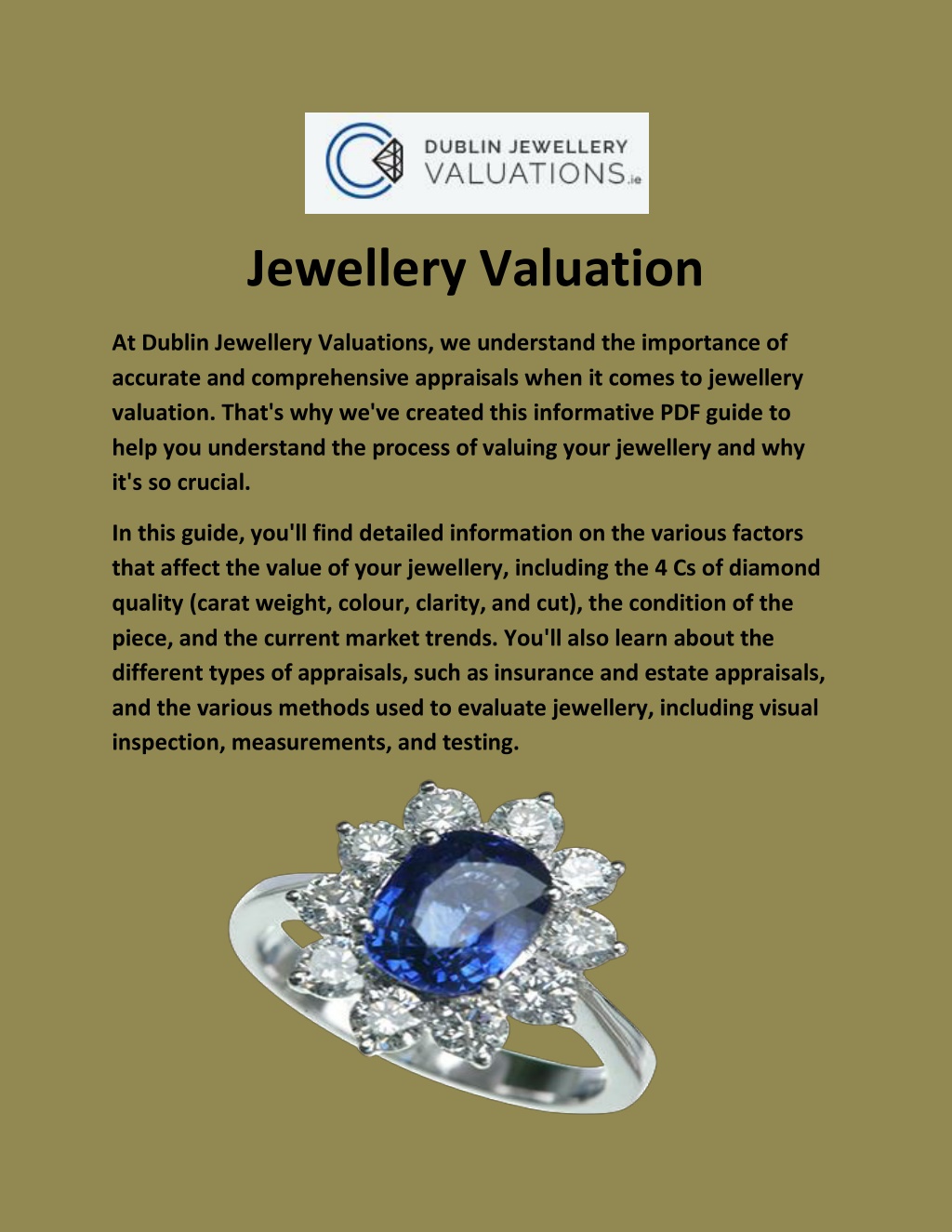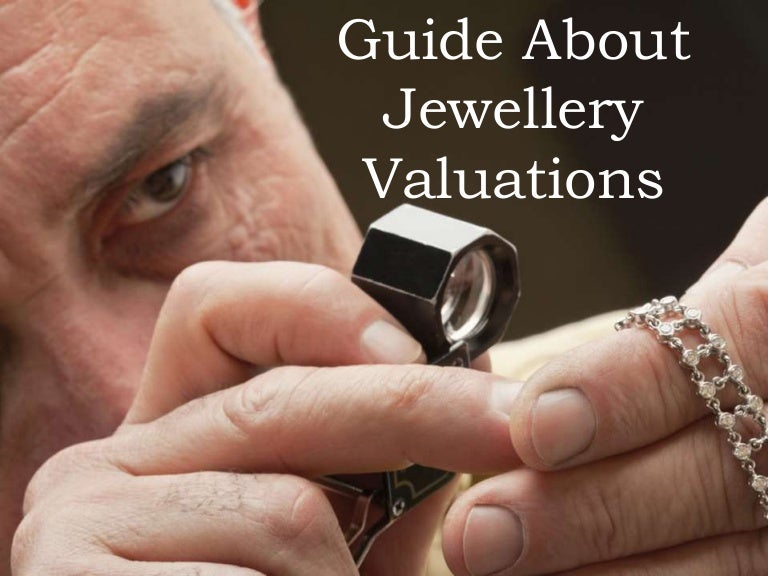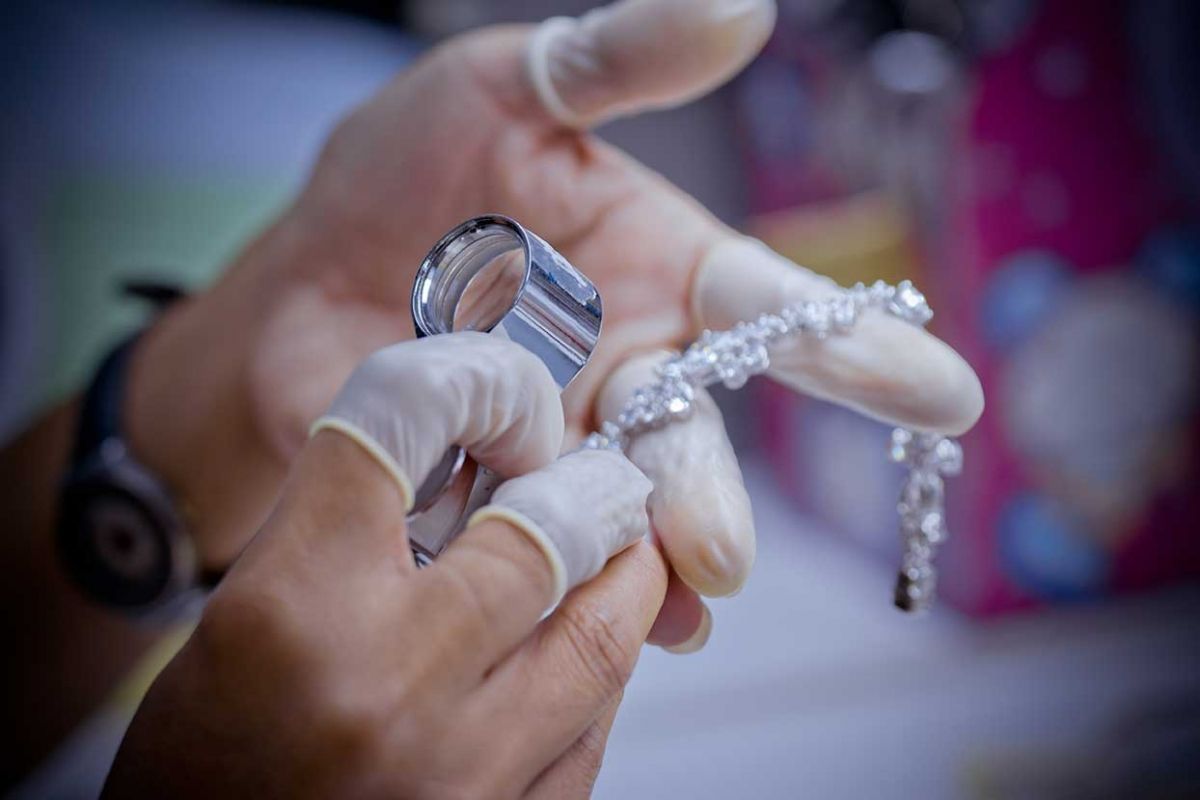The Essential Guide to Jewellery Valuation for Insurance
Related Articles: The Essential Guide to Jewellery Valuation for Insurance
Introduction
In this auspicious occasion, we are delighted to delve into the intriguing topic related to The Essential Guide to Jewellery Valuation for Insurance. Let’s weave interesting information and offer fresh perspectives to the readers.
Table of Content
- 1 Related Articles: The Essential Guide to Jewellery Valuation for Insurance
- 2 Introduction
- 3 The Essential Guide to Jewellery Valuation for Insurance
- 3.1 Understanding the Importance of Jewellery Valuation
- 3.2 The Valuation Process: A Step-by-Step Guide
- 3.3 Choosing the Right Jewellery Appraiser
- 3.4 Frequently Asked Questions (FAQs)
- 3.5 Tips for Protecting Your Jewellery
- 3.6 Conclusion
- 4 Closure
The Essential Guide to Jewellery Valuation for Insurance

Owning valuable jewellery is a source of pride and joy. However, it’s crucial to ensure its protection against unforeseen circumstances. This is where jewellery valuation for insurance comes into play. This comprehensive guide delves into the intricacies of this process, highlighting its significance and equipping you with the knowledge to safeguard your precious assets.
Understanding the Importance of Jewellery Valuation
Jewellery valuation for insurance is a specialized process that determines the fair market value of your pieces. This valuation is essential for several reasons:
- Accurate Insurance Coverage: A precise valuation ensures that your insurance policy provides adequate coverage in case of loss, damage, or theft. Without a proper valuation, you may find yourself underinsured, leading to significant financial losses.
- Proof of Value: In the unfortunate event of an insurance claim, a professional appraisal serves as irrefutable proof of the value of your jewellery. This documentation is crucial for facilitating a smooth and fair claims process.
- Peace of Mind: Knowing your jewellery is accurately valued provides peace of mind, allowing you to enjoy your possessions without the constant worry of inadequate protection.
The Valuation Process: A Step-by-Step Guide
The jewellery valuation process typically involves the following steps:
- Initial Consultation: You’ll meet with a qualified jewellery appraiser to discuss your needs and the pieces you wish to have valued. This initial consultation allows the appraiser to understand the scope of the valuation and gather essential information.
-
Examination and Documentation: The appraiser will meticulously examine each piece of jewellery, documenting its characteristics such as:
- Metal Type and Purity: Identifying the type and karat of the metal (e.g., 18K gold, platinum)
- Gemstones: Determining the type, size, cut, clarity, and color of any gemstones (e.g., diamonds, rubies, sapphires)
- Design and Style: Noting the unique design features, craftsmanship, and historical significance, if any
- Condition: Assessing the overall condition of the piece, including any wear, damage, or repairs
- Research and Market Analysis: The appraiser conducts thorough research, referencing current market trends, auction records, and industry publications to establish a fair market value for your jewellery.
-
Valuation Report: The appraiser compiles a detailed valuation report outlining the findings of their examination and research. This report typically includes:
- Description of the Jewellery: A comprehensive description of each piece, including its characteristics and details
- Valuation Methodology: Explanation of the methods used to determine the value
- Estimated Market Value: The appraised value of the jewellery, expressed in monetary terms
- Supporting Documentation: Photographs, certificates, and other relevant documents to support the valuation
- Delivery and Review: Once the valuation report is finalized, it is delivered to you for review. You can then utilize this report to secure appropriate insurance coverage for your jewellery.
Choosing the Right Jewellery Appraiser
Selecting a qualified and reputable jewellery appraiser is crucial for obtaining a reliable and accurate valuation. Look for an appraiser with:
- Accreditation and Certifications: Seek appraisers who hold recognized certifications from organizations such as the American Society of Appraisers (ASA) or the Gemological Institute of America (GIA).
- Experience and Expertise: Choose an appraiser with extensive experience in valuing various types of jewellery, including antique, vintage, and contemporary pieces.
- Professional Affiliations: Consider appraisers who are members of reputable professional organizations, such as the American Gem Society (AGS) or the National Association of Jewelry Appraisers (NAJA).
- Positive Reviews and Recommendations: Seek recommendations from trusted sources, such as insurance companies, jewelers, or other collectors. Check online reviews and testimonials to gauge the appraiser’s reputation and client satisfaction.
Frequently Asked Questions (FAQs)
Q: How often should I get my jewellery appraised for insurance purposes?
A: It is generally recommended to have your jewellery appraised every 3-5 years, particularly for pieces with significant value. This ensures that your insurance policy reflects the current market value and provides adequate coverage.
Q: What factors influence the value of jewellery?
A: The value of jewellery is determined by several factors, including:
- Metal Type and Purity: Higher karat gold and platinum are generally more valuable.
- Gemstones: The type, size, cut, clarity, and color of gemstones significantly impact their value.
- Design and Craftsmanship: Unique designs, intricate craftsmanship, and historical significance can increase a piece’s value.
- Condition: The condition of the jewellery, including any wear, damage, or repairs, affects its overall value.
- Market Demand: Current market trends and demand for specific types of jewellery can influence their value.
Q: What information do I need to provide to the appraiser?
A: When you meet with the appraiser, bring the following information:
- Purchase Receipts: Original receipts or invoices for the jewellery.
- Certificates of Authenticity: Any certificates or documentation confirming the authenticity of gemstones or metals.
- Previous Appraisals: Copies of any prior valuations you may have.
- Photographs: Clear photographs of the jewellery from various angles.
Q: How much does jewellery valuation cost?
A: The cost of a jewellery valuation varies depending on the complexity and number of pieces being appraised. It’s essential to inquire about the appraiser’s fees before proceeding with the valuation.
Q: Can I get a jewellery valuation online?
A: While some online platforms offer valuation services, it’s generally recommended to seek a professional appraisal from a qualified appraiser. Online valuations may not be as comprehensive or accurate as those conducted by an experienced professional.
Q: What should I do if my jewellery is lost or stolen?
A: If your jewellery is lost or stolen, contact your insurance company immediately. They will guide you through the claims process, and the valuation report will be essential for substantiating your claim.
Tips for Protecting Your Jewellery
- Keep Your Jewellery Insured: Ensure that your valuable jewellery is properly insured against loss, damage, and theft.
- Store Your Jewellery Securely: Store your jewellery in a safe deposit box or a secure location at home.
- Be Aware of Your Surroundings: Be cautious when wearing valuable jewellery in public places, and avoid displaying it excessively.
- Regularly Maintain Your Jewellery: Have your jewellery cleaned and inspected by a reputable jeweler to ensure its condition is maintained.
- Keep Records: Maintain detailed records of your jewellery, including purchase receipts, certificates, and appraisal reports.
Conclusion
Jewellery valuation for insurance is an indispensable step in safeguarding your precious possessions. By obtaining a professional appraisal, you ensure accurate insurance coverage, provide irrefutable proof of value, and gain peace of mind knowing your jewellery is adequately protected. Remember to choose a qualified and reputable appraiser, understand the valuation process, and follow the tips provided to ensure the security and value of your cherished jewellery.








Closure
Thus, we hope this article has provided valuable insights into The Essential Guide to Jewellery Valuation for Insurance. We hope you find this article informative and beneficial. See you in our next article!